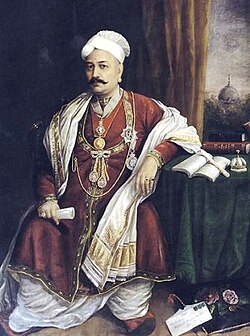Rajah, Sir Tanjore Madhava Rao | |
|---|---|
 Portrait of Sir T. Madhava Rao | |
| Diwan of Baroda | |
| In office 10 May 1875 – 28 September 1882 | |
| Monarch | Maharaja Sayajirao Gaekwad III |
| Preceded by | Dadabhai Naoroji |
| Succeeded by | Kazi Shahabuddin |
| Diwan of Indore | |
| In office 1873–1875 | |
| Monarch | Tukojirao Holkar II |
| Preceded by | Tukojirao Holkar II |
| Succeeded by | R. Raghunatha Rao |
| Diwan of Travancore | |
| In office 1857 – May 1872 | |
| Monarchs | Uthram Thirunal, Ayilyam Thirunal |
| Preceded by | Krishna Rao |
| Succeeded by | A. Seshayya Sastri |
| Personal details | |
| Born | 20 November 1828[1] Kumbakonam, Thanjavur Maratha kingdom |
| Died | 4 April 1891 Mylapore, Madras, British India |
| Spouse | Yamuna Bai |
| Children | T. Ananda Rao |
| Parent |
|
| Alma mater | Madras University |
| Occupation | politician, administrator |
| Profession | lawyer |
Raja Sir Tanjore Madhava Rao, KCSI (20 November 1828[1] – 4 April 1891), also known as Sir Madhava Rao Thanjavurkar or simply as Madhavarao Tanjorkar, was an Indian statesman, civil servant, administrator and politician who served as the Diwan of Travancore from 1857 to 1872, Indore from 1873 to 1875 and Baroda from 1875 to 1882.[2] He was the nephew and son of the former Travancore Diwans T. Venkata Rao and T. Ranga Rao.[3][4][5]
Madhava Rao was born in a prominent family of Deshastha Brahmins of Kumbakonam in 1828 and had his education in Madras.[6] After serving for two years in the Madras civil service, Madhava Rao was appointed tutor to the princes of Travancore. Impressed with his performance, Madhava Rao was transferred to the Revenue Department in which he rose step by step to become Diwan in 1857.
Madhava Rao served as Diwan of Travancore from 1857 to 1872 bringing about developments in education, legislation, public works, medicine, vaccination and public health and agriculture. He was also responsible for clearing Travancore's public debts. Madhava Rao quit as Diwan of Travancore and returned to Madras in 1872. He served as Diwan of Indore from 1873 to 1875 and as Diwan of Baroda from 1875 to 1882. In his later life, Madhava Rao actively participated in politics and was one of the early pioneers of the Indian National Congress. Madhava Rao died in 1891 in Mylapore, Madras at the age of 63.
Madhava Rao was respected and regarded for his administrative abilities. British Liberal statesman Henry Fawcett called him "the Turgot of India". In 1866, he was made a Knight Commander of the Order of the Star of India.
- ^ a b Lal 2015, p. 20.
- ^ Solomon & Bond 2006, p. 24.
- ^ Buckland 1971, p. 28.
- ^ Lethbridge 2005, p. 292.
- ^ Aiyangar 1995, p. 106.
- ^ Hemingway 2002, p. 220.